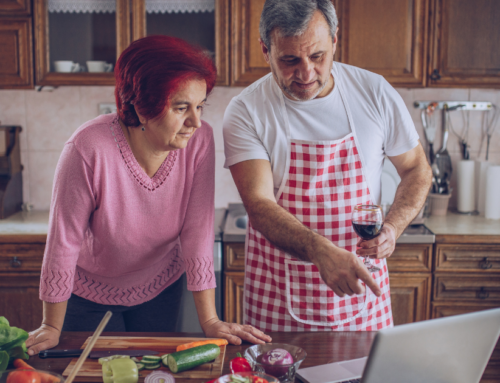Did you know that diminished or loss of hearing affects a senior’s ability to maintain good nutrition? The loss of smell and a reduction in taste buds is understandable, but hearing?
Diminished hearing or hearing loss makes holding a conversation with an eating partner difficult, frustrating, and embarrassing. It limits the enjoyment of the food and results in less being consumed.
Taste, smell, hearing, and various other reasons cause many seniors not to eat as healthy as they should. This leads to poor nutrition or malnutrition; the resulting reduced calorie intake can easily get mistaken as an illness or disease.
Changing Bodies = Changing Needs
As we age, our teeth change – the number of teeth, their condition, and even their arrangement. Ill-fitting dentures or the loss of teeth can lead to the avoidance of sticky and hard foods. Because of this, older adults with dental problems may avoid some vegetables and fruits, such as apples or uncooked carrots.
Aging adults also experience gastrointestinal changes: chronic gastritis, delayed stomach emptying, constipation, and gas. These can also lead seniors to avoid certain fruits and vegetables.
These factors help contribute to over 3.5 million seniors being malnourished. They also shed light on the importance of educating the elderly and family caregivers on the specific dietary needs of seniors.
Malnutrition and Vitamin Deficiencies in Seniors
The root causes of malnutrition are undernutrition and nutrient imbalances or deficiencies. Symptoms include loss of appetite, general malaise, and a lack of interest in wellness.
Common vitamin deficiencies include vitamins A, B, C, D, and E, calcium, niacin, and folic acid.
Addressing an Elderly Adult’s Nutritional Needs
Clearly, an older person’s quality of life is affected by nutrition, making focusing on good habits crucial.
The United States Department of Agriculture (USDA) Food Patterns recommends that people age 50 and over choose healthy meals each day from the following:
- Fruits — 1½ to 2 ½ cups
What is the same as ½ cup of cut-up fruit? A 2-inch peach or ¼ cup of dried fruit. - Vegetables — 2 to 3½ cups
What is the same as one cup of cut-up vegetables? Two cups of uncooked leafy vegetables. - Grains — 5 to 10 ounces
What is the same as one ounce of grains? A small muffin, a slice of bread, a cup of flaked, ready-to-eat cereal, or ½ cup of cooked rice or whole-grain pasta usually equal one ounce of grains. - Protein foods — 5 to 7 ounces
What is the same as one ounce of meat, fish, or poultry? One egg, ¼ cup of cooked beans or tofu, ½ ounce of nuts or seeds, or one tablespoon of peanut butter. - Dairy foods — 3 cups of fat-free or low-fat milk
What is the same as one cup of milk? One cup of yogurt or 1½ to 2 ounces of cheese. One cup of cottage cheese is the same as ½ cup of milk. - Oils — 5 to 8 teaspoons
What is the same as oil added during cooking? Foods such as olives, nuts, and avocado have a lot of oil in them. - Solid fats and added sugars (SoFAS) — keep the amount of SoFAS small
If you eat too many foods containing SoFAS, you will not have enough calories for the nutritious foods you should be eating.
There is no guarantee that an institution or hospital will meet these recommendations.
Let Us Help With Your Elderly Loved One’s Nutritional Needs
AmeriCare Plus’s personal care service includes meal preparation and assistance. We work with you and your elderly love one to help develop a nutritious meal plan that is appetizing and meets any specific dietary and nutritional needs. In addition, our caregivers provide companionship during mealtime and can also assist with feeding clients.
Call us today at 844-781-1451 or complete this online form to get a conversation started. We’ll provide you with a FREE in-home consultation to talk about the distinct needs of the aging adult in your life.
Continue Reading
Get a personal assessment.
Call us today at 1.844.704.9460
Schedule your free, no-obligation assessment today!










